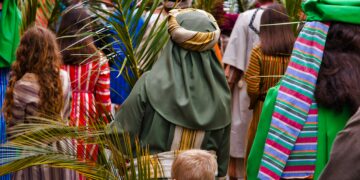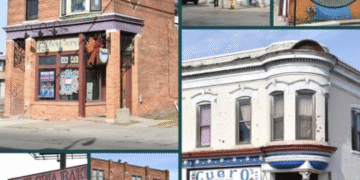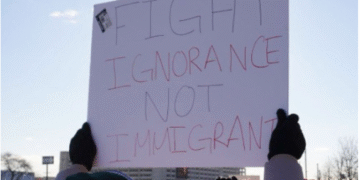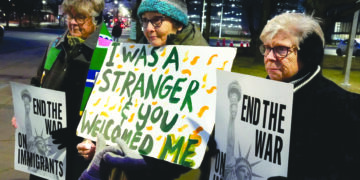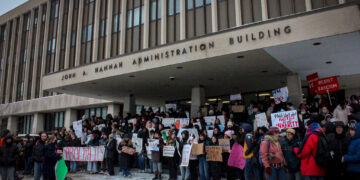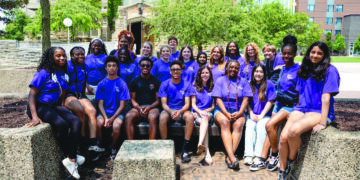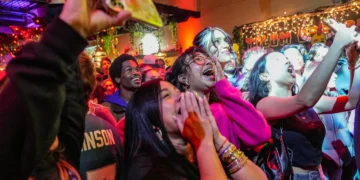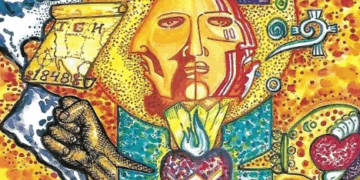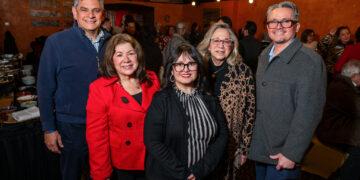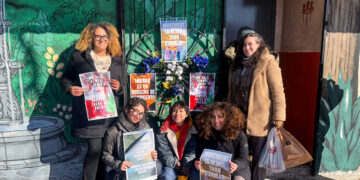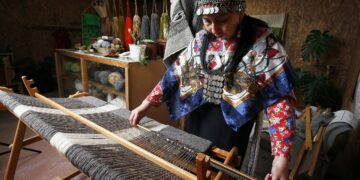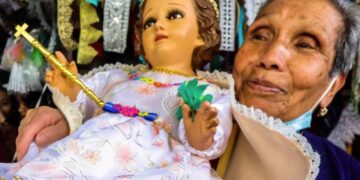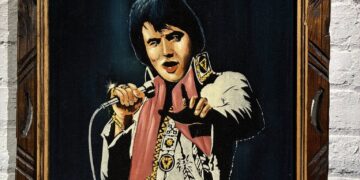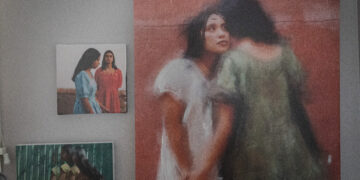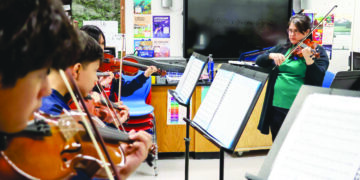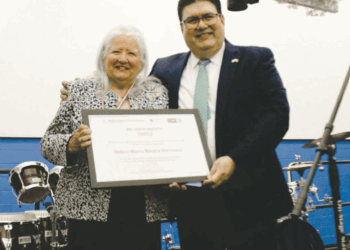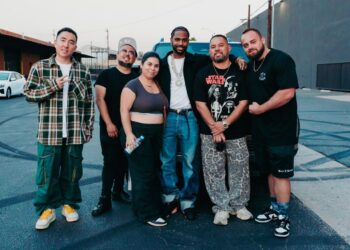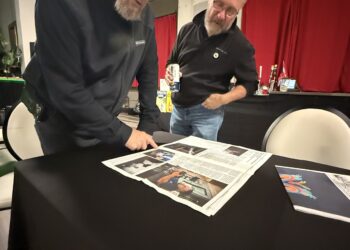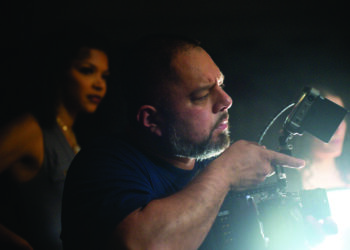Signal-Return’s letterpress shop is a nonprofit that caters to preserving the art community and teaching traditional letterpress printing in Detroit’s English Village. In recent months, the smell of ink and the feel of movable type set the stage for a project that connects personal history with shared memories. These days, artist Paloma Núñez-Regueiro stands at its presses, piecing together fragments of Latin America’s political past, not as a historian, but as a printmaker committed to ensuring those fragments could be seen, touched, and remembered.
Her new exhibition, Archivo Político Vivo, is the culmination of a four-month residency at Signal-Return. The centerpiece is an artist book, fifty-three accordion-folded pages bound Swiss-style, half printed with lead type and half in a pictographic text she designed herself. The book pairs official U.S. government documents on interventions in Latin America, dating from the 1823 Monroe Doctrine to 2001, with lyrics, poems, and oral traditions that emerged in the same periods.
“It was a situation of historical erasing,” Núñez-Regueiro says. “But the idea was to show how resilient we are as Latinos, how many of our songs, stories, and poems came from those same years of conflict. You can break into song at any time. That voice can’t be silenced.”
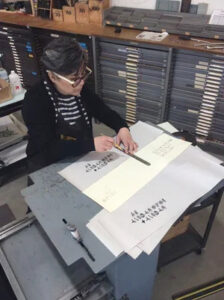
Núñez-Regueiro was born in Lima, Peru, in 1974 to a Mexican mother from Veracruz and a Chinese-Peruvian father. In 1983, at the height of the Shining Path guerrilla conflict, her family fled to Mexico. Welcomed by her mother’s relatives, she adapted to a new home but never lost her Peruvian accent.
In Mexico, she studied at the Facultad de Artes Plásticas in Xalapa, Veracruz, where she found her way into the politically charged, male-dominated world of printmaking.
“It was like discovering a voice I didn’t know I had,” she recalls. In 1996, she moved to the United States, earning a Bachelor of Fine Arts from the Rochester Institute of Technology. Years in Argentina and Mexico deepened her connection to the diverse traditions of Latin American art.
Now based in Ann Arbor and a resident at Ypsi Alloy Studios, Núñez-Regueiro’s work is steeped in themes of migration, otherness, and the layered identities of women of color.
Her connection to Signal-Return runs deep. “I’ve been working here for three years, teaching linoleum print workshops,” she says. Even before that, she was drawn to the shop’s extensive type collection. When the residency came, she knew she wanted to work with those materials.
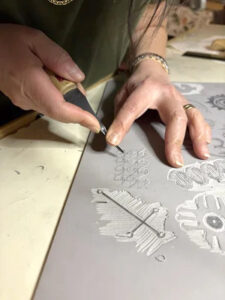
The seed of Archivo Político Vivo grew from her fascination with historical records of U.S. interventions in Latin America. She studied over books and documents, including declassified files made public through the Freedom of Information Act (FOIA).
“I started pulling at this thread,” she says.
“I realized so much of our culture , our music, our poetry, was born from the consequences of these interventions.”
Each page of the book matches a government record with cultural expressions from the same moment in time, verses by Cuban independence leader José Martí, songs sung at kitchen tables, and lullabies passed down through generations. The movable type captures the stark, official language of the documents; the pictographic type renders the songs and poems as visual poetry, each symbol assigned to a letter in her self-made alphabet.
“It’s like reconnecting what happened to us with why it happened,” she says. “These are the words we carried with us, the ones that made us resilient.”
She described the imagery in the project as dark but uplifting.
“I wasn’t going for that feeling,” Núñez-Regueiro says.
“But if you look at the reality of what happened to our countries, that darkness was real. What’s amazing is that we still sing, we still dance, we still celebrate ourselves. We keep adding to the communities we’re part of, even far from home.”
Her pictographic poems are a kind of coded language. They echo the resilience she sees in Latin American culture, the insistence on joy and creativity even in the face of political violence and displacement.
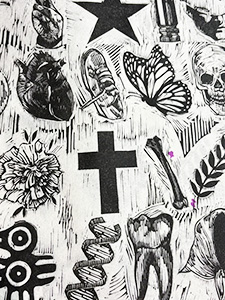
The exhibition doesn’t just present the finished book. Visitors will see process prints, plates, and sketches, the behind-the-scenes labor of printmaking.
“I want people to see what goes into creating something like this,” she says. “Printmaking can feel intimidating or overlooked as an art form. Maybe this will spark curiosity for someone to try it, or to join this community.”
For Núñez-Regueiro, Archivo Político Vivo is both personal exploration and cultural preservation. It charts the history of a region shaped by intervention, yet refuses to flatten it into a story of loss alone. Instead, it shows the parallel story of survival, reinvention, and song.
As she threads together these timelines, she’s also bridging her own, from a childhood in Lima, to an adolescence in Veracruz, to an artist’s life in Michigan.
“It was a need, an exploration of my own history,” she says. “But it’s also the history of the Latino diaspora living in the U.S. and around the world. By putting these voices side by side, I’m saying: We were here. We are here. And we’re still singing.”
This exhibition will be open for viewing until September 5th during open store hours.
Signal Return
9301 Kercheval, Detroit, Michigan 48214
Hours:
- Thurs 10-8
- Fri 10-4
- Sat 10-6
- Sun 10-4
This article and photos were made possible thanks to a generous grant to EL CENTRAL Hispanic News by Press Forward, the national movement to strengthen communities by reinvigorating local news. Learn more at www.pressforward.news.





